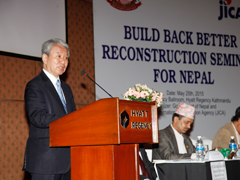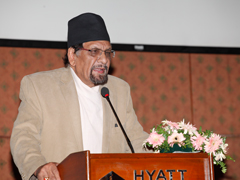The Japan International Cooperation Agency held the seminar "Build Back Better Reconstruction Seminar for Nepal" in collaboration with the Government of Federal Democratic Republic of Nepal in Kathmandu on May 25, one month after Nepal was hit by a magnitude 7.8 earthquake on April 25.
This seminar was organized to support Nepal’s reconstruction effort by sharing Japan’s experience and knowledge on earthquake reconstruction. During the seminar, Japanese experts presented practical examples of reconstruction measures that may be applied to Nepal's future reconstruction planning and specific recovery projects. The seminar received more than four hundred participants which were more than expected.

JICA President Akihiko Tanaka gives an organizer's greeting on behalf of host JICA.
This earthquake was the first large one after the Third UN World Conference on Disaster Risk Reduction held in Sendai, Japan, in March 2015. Throughout the Conference, "Build back Better" as well as achieving a seamless transition from humanitarian assistance to recovery and reconstruction assistance were emphasized. The "Build Back Better" concept* was adopted as a key element (Priority for Action) of the “Sendai Framework for Disaster Risk Reduction 2015-2030”, a guiding agreement for disaster risk reduction for the UN member countries. The concept was also reflected in Sendai Cooperation Initiative for Disaster Risk Reduction announced by the Japanese Government.
The seminar, which consisted of four sessions, began with a prayer for the people who lost their lives in the disaster. JICA President Akihiko Tanaka expressed his condolences to the Nepalese people for the damage caused by the earthquakes. In his remarks, he emphasized the importance to start planning for reconstruction and development from very early state of recovery. Touching upon Japan’s experience, Tanaka reiterated the importance and necessity of creating reconstruction policies that reflect the "Build Back Better" concept to rebuild a society that is stronger and more resilient than before.
Following the remarks from Ambassador of Japan to Nepal Masashi Ogawa, deputy director of the Regional Bureau of the United Nations Development Programme (UNDP) and the vice-president of the Asian Development Bank (ADB), Nepalese Finance Minister Ram Sharan Mahat gave an opening address. He expressed his willingness to rebuild Nepal by incorporating the “Build Back Better” concept and expressed high hopes to overseas assistance on supporting his leadership. He also announced a plan to hold an international donors’ conference on June 25, two months after the earthquake.
In the first session of the seminar, Professor Kimiro Meguro and Professor Kazuki Koketsu of the University of Tokyo, Associate Professor Shinichiro Mori of Ehime University and JICA Senior Advisor Tatsuo Narafu presented the characteristics of building damage in Nepal based on other countries’ cases. In the presentation, they pointed out that this earthquake was lower in seismic intensity than was assumed in the survey carried out by JICA in 2002, which means that the region is still at risk of suffering from more catastrophic earthquakes in the future. In addition, they also pointed out the fact that the type of housings which collapsed the most were housings with old-style building materials such as mud and bricks, and were built before 1994 when the current building code was enacted. Besides such housings, historic buildings made with a construction method that places heavy structures on the roof and upper parts of the building were heavily damaged or collapsed as well.

Nepalese Finance Minister Ram Sharan Mahat gives an opening address.
In the second session, Hiroshi Kaneko, director of the Urban Planning Department of the National Institute for Land and Infrastructure Management, Ministry of Land, Infrastructure, Transport and Tourism (MLIT); Hiroyasu Shingai, head of the Urban Facilities Division of the National Institute for Land and Infrastructure Management, MLIT; and Shigeki Unjoh, research coordinator for Earthquake Engineering of the Public Works Research Institute (PWRI), gave a presentation on urban planning methods and anti-seismic measurement such as earthquake resistant housing and infrastructure, to build a disaster resilient society. As concrete examples, Masahiko Murata, director of the Research Department of the Disaster Reduction and Human Renovation Institution and Professor Fumihiko Imamura of Tohoku University shared cases on disaster resilient urban planning and mental care practices in the Great Hanshin-Awaji Earthquake (1995) and the Great East Japan Earthquake (2011).
In the third session, Vice-President Satoru Nishikawa of Japan Water Agency and JICA Senior Advisor Masami Fuwa gave a presentation on the role of government in strengthening disaster risk reduction capacity in Nepal and JICA’s future possible assistance policies on Nepal reconstruction. In this session, ADB also shared its experiences and lessons from past earthquakes regarding housing reconstruction.
As a last session, JICA organized a panel discussion to discuss on disaster risk reduction measures to mitigate damages from future earthquakes in Kathmandu metropolitan area. The discussion was moderated by JICA Senior Advisor Kimio Takeya and the participants were the Nepalese Government's National Planning Commission, the Ministry of Federal Affairs and Local Development, the Kathmandu Valley Development Authority and the Department of Urban development and Building Construction, as well as the international cooperation agencies such as ADB, the UNDP and JICA. During the debate, panelist discussed on topics such as how to put "Build Back Better" into practice in housing and residential areas, how to secure coordination among diverse stakeholders and how to raise disaster awareness among citizens.
Following the seminar, question and answer session was held. The question and comments raised by the participants reflected their seriousness of absorbing all necessary know-hows from Japanese experts. Participants asked for more detailed explanations for the damage from the earthquakes. They also asked for detail information on Japanese techniques related to earthquake countermeasures. Furthermore, there were many participants who wanted to deepen their understanding by directly talking to presenters during the break time.
After the remarks by Akira Nakamura, director general of the Infrastructure and Peacebuilding Department of JICA, Professor Govind Nepal of the National Planning Commission closed the seminar by stating, "This seminar was very well-timed and its content will be very useful in future reconstruction assistance to Nepal."
Aiming to 'Build Back Better'
This seminar was a good example of all-Japan approach, a collective action of Japanese actors including central, local government, academia and JICA to gather their knowledge on disaster risk reduction and apply such measures in natural disasters abroad.
Just after the earthquake, the Nepalese Government showed strong initiative in leading the formulation process of the reconstruction plan. They have requested the donors including JICA to carry out a Post Disaster Needs Assessment (PDNA) as soon as possible so that the Nepalese government can lead the effort to formulate the plan. In response to such a strong initiative, the World Bank and other donors started working on PDNA on May 20 and funding requirements for reconstruction are expected to be finalized by mid-June.
JICA strongly hopes that the Build Back Better concept will be incorporated in Nepal's reconstruction plan and Japan's experiences on earthquake reconstruction will be utilized by the Nepalese Government as a reference on formulating a reconstruction policy. JICA plans to continue extending seamless assistance that will contributes to building a resilient society in Nepal.
*One of four priorities for action under the Sendai Framework for Disaster Risk Reduction 2015-2030. Carrying out reconstruction that prepares for future disasters, including reconstruction projects that incorporate the viewpoints of legal revision and disaster risk reduction, based on the lessons of past disasters. The policies Japan has carried out since reconstruction have also been based on this idea and Japan advocated it more than previously as an important disaster risk reduction action to take along with seamless assistance as it moved toward adoption of this framework.




scroll